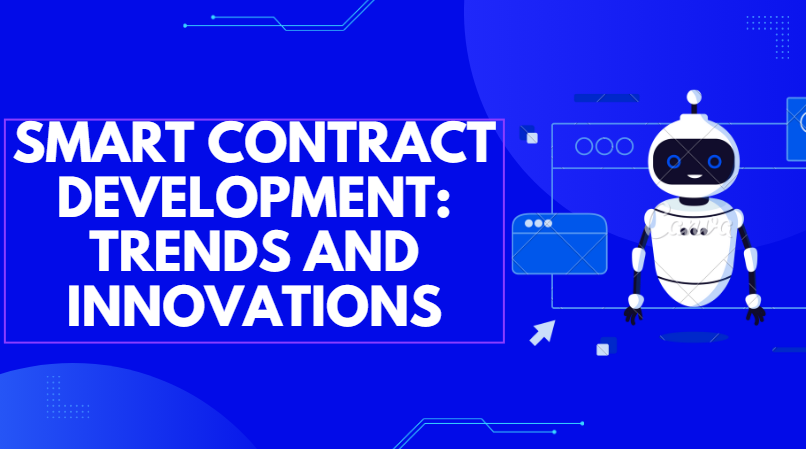Smart contract development has been one of the most groundbreaking advancements in the blockchain ecosystem. These self-executing contracts enable automated and trustless transactions without the need for intermediaries, revolutionizing how agreements are made and executed.
As the blockchain technology landscape continues to evolve, smart contract development solutions are at the forefront of transformative innovations, shaping the future of decentralized applications and industries across the globe.
Advancement of Smart Contracts
Initially conceived as digital agreements with predefined conditions, smart contracts have come a long way from their humble beginnings. While their fundamental premise remains the same, their applications have grown increasingly sophisticated. Today, smart contracts are capable of executing complex automated processes, enabling decentralized finance (DeFi), non-fungible tokens (NFTs), and seamless cross-chain interactions.
Trends of Smart Contract
1.Integration with Internet of Things (IoT) Devices:
The convergence of smart contracts with Internet of Things (IoT) devices has opened up a world of possibilities. Through this integration, smart contracts can interact with real-world data collected by IoT sensors, enabling automated actions based on the data’s verifiable inputs.
For example, a smart contract embedded in a smart home system can automatically adjust room temperatures based on real-time environmental data from IoT sensors, optimizing energy consumption and enhancing user comfort.
2. Decentralized Finance (DeFi) and Smart Contract Financial Products:
Decentralized finance has emerged as one of the most exciting and impactful trends in the blockchain space. Smart contracts play a crucial role in DeFi platforms by enabling a wide range of financial products and services.
These include lending and borrowing protocols, yield farming mechanisms, decentralized exchanges (DEXs), and automated market makers (AMMs). Smart contract-powered DeFi solutions offer users greater financial autonomy and transparency compared to traditional centralized financial systems.
3. Non-Fungible Tokens (NFTs) and Smart Contract-Based Digital Assets:
The rise of non-fungible tokens (NFTs) has created a new paradigm in digital asset ownership. NFTs are unique, indivisible tokens that represent ownership of digital assets such as art, collectibles, virtual real estate, and more.
Smart contracts are the backbone of NFT ecosystems, facilitating the creation, ownership, and transfer of these unique assets. Artists, musicians, and content creators are exploring NFTs as a means of direct monetization and engagement with their audiences.
3. Interoperability and Cross-Chain Smart Contracts:
As blockchain networks grow and diversify, the need for interoperability becomes increasingly important. Cross-chain smart contracts enable seamless interactions between different blockchain platforms, promoting data sharing, asset transfers, and collaborative applications. Interoperability expands the possibilities for cross-platform innovation and strengthens the overall blockchain ecosystem.
Innovations
1. Oracles and External Data Integration:
Oracles act as bridges between the blockchain and the external world, providing smart contracts with real-world data. This data can be critical in decision-making processes within the contract. For instance, oracles can fetch stock market prices, weather data, or sports scores, allowing smart contracts to execute actions based on these real-time inputs. Properly integrating oracles enhances the functionality and reliability of smart contracts in various use cases.
2. Self-Amending Contracts and Upgradable Smart Contracts:
Traditional smart contracts are immutable once deployed, which can be limiting when updates or improvements are necessary. Self-amending contracts and upgradable smart contracts are designed to allow modifications while maintaining the integrity of the contract.
These innovations enable contracts to adapt to changing circumstances, avoid obsolescence, and improve efficiency over time.
3. Privacy-Focused Smart Contract Solutions:
While blockchain technology offers transparency and immutability, privacy remains a concern for certain use cases. Privacy-focused smart contract solutions aim to strike a balance by offering selective visibility of transaction data. Zero-knowledge proofs, off-chain computations, and private data sharing mechanisms are being explored to address privacy challenges without compromising the security of the underlying blockchain.
4. Energy-Efficient and Eco-Friendly Smart Contract Platforms:
As blockchain adoption grows, so does its energy consumption. Eco-friendly and energy-efficient smart contract platforms are actively being developed to reduce the environmental impact of blockchain technology. Proof-of-stake (PoS) consensus mechanisms and layer-2 scaling solutions are some of the innovations employed to make smart contract platforms more sustainable and eco-friendly.
Potential and Challenges in the Future
While smart contract development solutions show immense promise, they are not without challenges. Complex smart contracts can introduce new attack vectors, making security a primary concern. Continuous security audits, code reviews, and best practices adoption are vital to mitigating risks and safeguarding users’ assets.
Interoperability challenges and the need for standardization remain on the radar as blockchain networks continue to grow and diversify. Striving for seamless cross-chain communication will be essential for maximizing the potential of smart contracts in various decentralized applications.
Additionally, regulatory and legal frameworks are still catching up with the rapid advancements in smart contract technology. Clarity on legal enforceability and dispute resolution in smart contracts will play a significant role in broader adoption.
Conclusion
In conclusion, the future of smart contract development is filled with exciting trends and innovations that hold the potential to revolutionize industries, redefine ownership, and foster greater financial inclusion. Integration with IoT, the rise of DeFi and NFTs, and advancements in interoperability will continue to shape smart contract ecosystems.
As these technologies mature and overcome challenges, smart contract development solutions will further accelerate the growth of the blockchain ecosystem and drive the adoption of decentralized applications worldwide.


